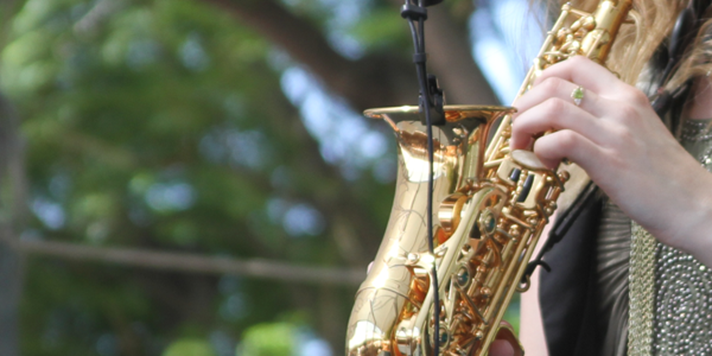We’ve compiled a short collection of tips for the advanced saxophonist (someone with two years or more of experience). If you feel anything is missing from this article, please feel free to let us know in the comments! You can also read our tips for the beginning saxophonist here.
What should you keep in your saxophone case?
The same goes for you as the beginning student, you need the same things in your case, and so you don’t have to go back and read that article again, I listed them here as well. Your saxophone (I know this sounds obvious, but I have known kids that forget parts of their saxophone at home or brought the wrong saxophone case and the sax was in the other case back at their house), your saxophone neck, a mouthpiece, a ligature, your ligature/mouthpiece cap, a neck strap, and 2.5 or size 3 reeds (aka medium or medium soft). But sometimes, by this stage, you have found that a harder reed has worked for you and you might want a 3 or 3.5 (medium hard). Make sure that you keep several GOOD reeds in your case. It is extremely frustrating for a band director when you break a reed and it was your only one.
I also recommend that you keep a cleaning cloth in your case, something to store your reeds in, powder paper or a dollar bill to fix sticking pads, and something to dry out the inside of your neck and mouthpiece after you are done using them. I also keep electric tape in my sax case for quick fixes and to put on the top of my mouthpiece to make it more comfortable for my teeth instead of buying the little plastic stickers. Lastly, I recommend that you keep a small screwdriver in your case. At this stage, you should be able to start doing small repairs on your sax when screws and things begin coming loose. It might help to keep screwdrivers of a couple different sizes – and they should be flathead screwdrivers.
Playing:
When you play, you should sit up straight and play with your sax between your legs unless you play tenor or bari, then you should play with your sax off to right of your legs for support. You should know the circle of fourths or fifths. You should know your major, minor, blues, dominant or mixolydian, and dorian scales on the full range of your instrument at the least. As far as soloing, you should have a basic idea of what to play. You should know how to read chord changes, and know your scales. You should recognize blues in Concert F, Bb, and C (that is D, G, and A for Eb instruments and G, C, and D for Bb instruments). You should recognize rhythm changes. Also, you should be able to recognize several jazz standards and have a few standard melodies memorized. It also would help to own a Fake Book or Real Book.
You should be able to read music, know basic and some more complex, syncopated rhythms, and how to tongue. Tonguing is a real issue with young players because they either do not know how to tongue and attack using just air, or tongue way too hard.
You should be able to recognize that your saxophone is in Eb if you play alto or bari, and Bb if you play tenor or soprano. You should also begin being able to transpose from concert pitch to the key of your instrument and vice versa.
As far as listening, you should listen to more jazz (if that’s the genre you’re interested in), and be able to recognize several musicians’ names, especially those who play your instrument. You should know names like Michael Brecker, John Coltrane, Charlie Parker, Wayne Shorter, Cannonball Adderley. As far as non sax players, you should know names like Duke Ellington, Miles Davis, Louis Armstrong, Ella Fitzgerald, etc. You should own a few if not several jazz CDs, and have a jazz radio station that you listen to regularly. In addition, you should have begun to start to try and play along with your recordings, and to transcribe some of your favorite solos.
Practice:
You should have a regular practice routine that includes scales, long tones and tuning, and working with a metronome. It also helps to have both classical and jazz etudes to help you with phrasing and technical ability. Books that I recommend are “Patterns for Jazz”, the Charlie Parker Omnibook, and the Neihaus etude books.
I also think that you should study privately on a weekly basis and also follow the instructions that your teacher gives you for practice.
Other:
The last, but most important thing I recommend is to go out and see live musicians play jazz. It helps you to see what it is like playing as a professional musician, and you also get to hear great music. Usually, there are local venues and restaurants that have live jazz groups perform that you can go see as opposed to spending a fortune to go to a jazz concert at a theater. Both are great, but very different, so it is up to you to choose which you want to attend. I recommend both, and would go to both if you can.
Want more tips on what it takes to be a great musician? Check out our popular FREE eBook – Advice for Young Musicians: From Established Music Professionals.
[template id=”182″]
